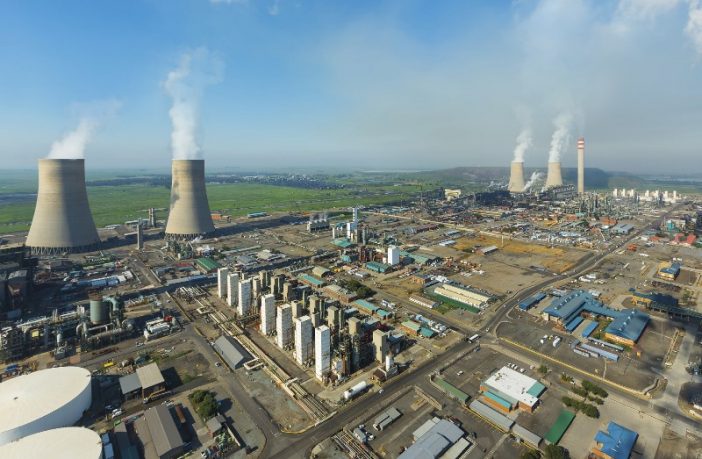- Just Share has published a briefing on Sasol Limited’s 2023 climate disclosures ahead of its annual general meeting (AGM) scheduled for 17 November 2023.
- Sasol has asked shareholders to endorse its “commitment to and progress on its decarbonisation pathway which supports the Company’s ability to create long-term value”.
In 2021, Sasol published a new decarbonisation plan for “Future Sasol”, including targets to reduce its greenhouse gas (GHG) emissions by 30% by 2030. In its 2021 Climate Change Report, Sasol indicated that it had “identified opportunities that exceeded expectations” and its “tailored target setting and roadmap approach” would “ensure a scientifically sound, robust and credible process”.
In short, it reported that the Energy business would meet the 2030 target through: the decommissioning of boilers, the increased use of renewable energy, and the introduction of about 40 – 60 petajoules per annum of liquified natural gas (LNG) to reduce Sasol’s reliance on coal.
Just Share and other stakeholders pointed out, in 2021, that there was a concerning lack of detail about several crucial elements of Sasol’s ambitions and actions, which made it extremely difficult to assess their feasibility and credibility. Importantly, Sasol’s decarbonisation ambitions were not accompanied by short-term milestones and detailed action plans. This persisted in 2022.
In its 2023 reporting suite, Sasol now concedes that it may not meet its 2030 GHG emission reduction targets. Its long-stated preference for “optionality” and its continued failure to set short-term decarbonisation goals against which management can be held accountable make this admission unsurprising.
Sasol takes no responsibility for this potential failure, instead blaming various external “vagaries and variables”, and “headwinds” which are “resulting in an emerging gap to targets and needs to be managed to achieve competitive returns”.
Most worrying is that Sasol does not appear to have a Plan B – or at least not one it has disclosed to its investors and other stakeholders.
Seven years remain until the end of 2030, by which time global GHG emissions need to be almost halved to limit the worst impacts of global heating. Sasol is the biggest private emitter of GHGs in South Africa, and it is one of the biggest corporate emitters of GHGs on earth. Its Secunda facility is the world’s largest single point source of GHGs. Sasol’s decarbonisation strategy and targets, and whether or not it achieves them, are crucial to the decarbonisation trajectory of the country.
Bizarrely, Sasol now reports that it is “moving beyond a predominant focus on addressing climate change”, even though it has not shown any meaningful progress in meeting its emission reduction targets. In fact, its scope 1 and 2 emissions have increased in the past reporting year, and it expects emissions to increase further in the near term.
Sasol also appears to be backtracking on its renewables commitments, including by allowing itself an extra year for integrating 600 MW of renewable power into its operations and by its removal, without explanation, of a previous commitment to procure 40% renewables by 2026 for its Energy business.
Air pollution appeal
Sasol now claims that achievement of its 2030 GHG emission reduction target (set in 2021) is contingent on emissions of toxic air pollutant SO2 (not a GHG) from the Secunda coal boilers being regulated through an alternative load-based emission limit (for which Sasol unsuccessfully applied in June 2022). In other words, Sasol states that, unless its SO2 minimum emission standards (MES) appeal succeeds, it will not achieve its committed GHG target to reduce emissions by 30% by 2030.
Sasol’s assertion that it cannot achieve its decarbonisation targets unless its toxic air pollution appeal succeeds is reminiscent of the company’s legal action against the then-Minister of Environmental Affairs, launched in 2014, against the introduction of the MES. When Sasol was granted postponements of compliance with the MES, it withdrew the litigation.
Just Share’s voting recommendations
For the reasons set out in the briefing, Just Share recommends that shareholders vote against Sasol’s “Say on Climate” resolution. Instead of continuing to endorse Sasol’s inadequate approach, responsible shareholders should demand clearer short- and medium- term targets and milestones, detailed action plans, and meaningful accountability mechanisms for executives and board members. This is essential to enable them to regularly assess: whether Sasol’s ambition is feasible, whether it is making adequate progress, and the likelihood of Sasol meeting its longer-term emission reduction objectives.
Just Share also recommends that shareholders vote against the re-election of non-executive director Muriel Dube. Sasol does not have a board committee dedicated to overseeing the company’s management of climate risk, but it reports that the Safety, Social and Ethics Committee (SSEC) “is appointed to provide integrated strategic direction on sustainability, safety, social and ethics matters, including Sasol’s climate change response”. Considering Sasol’s multiple failures on this front, Ms Dube, as chair of the SSEC, should not be reappointed.
Download the full briefing HERE
Source: Just Share















